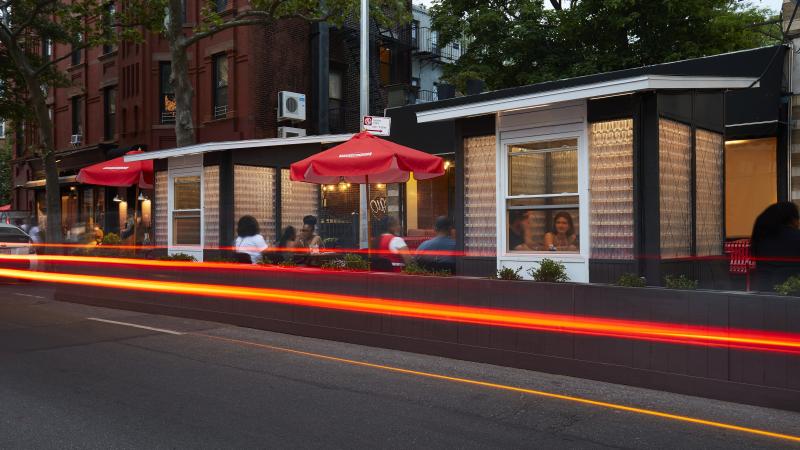Dining cabins offer new use for specially designed interlocking bottles
June 30, 2021

In the wake of the COVID-19 pandemic, restaurants throughout New York City and elsewhere use bespoke outdoor structures to offer safer dining experiences for their customers. However, many of these installations do not adequately protect servers, physically separate diners, provide thermal comfort, or easily disassemble if street maintenance is needed.
In addition to offering all of these features, a new project called Friendship Cabins — designed by researchers at the Center for Architecture Science and Ecology (CASE) at Rensselaer Polytechnic Institute in collaboration with the team at Friendship Products — has the added benefit of being made with upcycled, environmentally friendly materials.
The first Friendship Cabins were recently installed at Peaches Kitchen & Bar in Brooklyn under the supervision of Josh Draper, a lecturer in the School of Architecture at Rensselaer. Two cabins were built using Friendship Bottles, next-generation interlocking plastic bottles, as infill for the lumber walls of the structures.
“Outdoor dining is a laboratory for the future of smart design in New York City,” Draper said. “Friendship Cabins are not only practical, they are robust test beds for CASE to reimagine health and hospitality, plastic waste, and public performance in the city.”
The cabins are a new use for an ongoing architectural and engineering research project at Rensselaer examining how to best utilize interlocking Friendship Bottles, made using patented technology from Friendship Products. In lieu of becoming yet more waste floating in the oceans, these bottles are designed to be upcycled as building materials. Other research at Rensselaer is examining how Friendship Bottles could be used to build shelters following a hurricane or other natural disaster.
“Friendship Cabins demonstrate that bottles made with this new technology can be upcycled to create useful and compelling structures,” said Tim Carlson, the managing partner of Friendship Products. “This technology can convert single-use bottles into building material that will never end up in the ocean.”
Movable and easily disassembled, the cabins can be shifted for street maintenance, expanded, or upgraded. Seating four people comfortably, each cabin is constructed with 2,144 Friendship Bottles. Engineered for 105 mph winds as per New York State code for temporary structures, the cabin wall modules were mechanically tested on a shake table and shown to surpass required capacity.
“We have learned in the pandemic that even with COVID-19 public health and social distancing requirements, people crave the experience of coming together to share food, conversation, laughter,” said Craig Samuels, an owner of Peaches Restaurant. Co-owner Ben Grossman said, “What started out as a simple neighborly communication has turned into a new way to serve our greater community through the smarter use of our environment.”
The sustainable and future-focused nature of Friendship Cabins and related projects exemplifies the cross-disciplinary research into decarbonizing urban environments being led by the new Institute for Energy, the Built Environment, and Smart Systems (EBESS), the launch of which was recently announced by Rensselaer President Shirley Ann Jackson at the Leaders Summit on Climate hosted by President Biden.
At Rensselaer, Draper’s partners on this project are Mohammed Alnaggar, an assistant professor of civil and structural engineering, and Alexandros Tsamis, an assistant professor of architecture and the associate director of CASE.
Several undergraduate students in the School of Architecture at Rensselaer have contributed to research on Friendship Bottles, and specifically the Friendship Cabins project. For example, students designed scenarios using smart lighting and ventilation to support health protocols and explore new ideas of hospitality and art within a community.